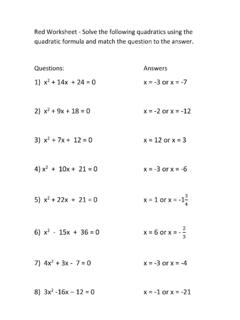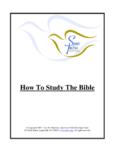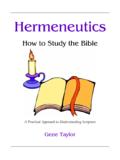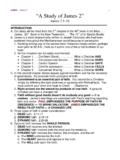Transcription of Religious Studies GCSE Learning notes
1 1 Religious Studies gcse Learning notes Contents 2 Topic list 3-23 Beliefs, teachings and practices of Christianity notes 24-27 BTPC Example questions and exam information Note: this pack largely focuses on the knowledge of Christian beliefs and practices which you must have. Your evaluation of these beliefs and practices is essential. You should therefore be applying evaluation as you work through these notes . Think: why is this important? who is it important to? is this wrong? who would say so? what do I think? what does this mean for those who believe/practice and those who don t? and so 2 Christianity: Beliefs and teachings & practices TOPICS Topic Secure?
2 Nature of God Concept of God as a Trinity of persons biblical accounts of creation The problem of evil and suffering Jesus Christ Incarnation, Crucifixion, Resurrection and Ascension The concept of salvation Eschatological beliefs and teachings Worship Sacraments Prayer The role and importance of pilgrimage and celebrations to Christians The role of the church in the local community and living practices Mission The role of the church in the wider world. 3 Beliefs, teachings and practices of Christianity notes Sources of wisdom and authority In your longer answers, you are expected to make reference to sources of wisdom and authority.
3 A range of sources tick the box here biblical quotations, general biblical themes, Church teaching, ..ologies and ..isms ( Liberation Theology or Femenism), the words/actions of a key Christian figure. The examiners are looking for you to pin down what you are saying and give it more academic clout know where it might come from, from where it was grown, what support it You also need to think about the significance or importance of the particular teaching you provide and the source of wisdom/authority it belongs to. Most broadly, you should consider what brings authority to a teaching / person. Pontius Pilate s question to Jesus what is truth?
4 Is apt here. o Does truth bring authority? How do you know it is true? What is needed to prove truth? o Does support bring authority? The majority of people think this way o Does God bring authority? How is God revealed? o Does a positive outcome bring authority? this diet really works, just look at the 4 BELIEFS Nature of God You need to know what Christians mean by God . What is this being s nature? What is he like? Think about how this God can be described? Indeed, can he be described? Huge emphasis in Christianity on monotheism (the belief in there being only one God). Christianity, remember, is grown out of Judaism, where monotheism took on particular importance, standing out against the many polytheistic beliefs at the time.
5 Anselm defined God as that than which nothing greater can be conceived. This means he is the greatest possible being. Can you see from this why he cannot be one amongst many? You may wish to link in your understanding of the causation argument here. God is not a creator, he is the Creator (note: the capital will often be used to emphasise his uniqueness and supremacy). Based on this idea of the greatest possible being and supported by biblical writings, Christians hold God to be benevolent, omnipotent, omniscient, eternal, transcendent, immanent, personal, forgiving, a judge. Make sure you know what each of these means and are able to justify their belief in each one.
6 If he is the greatest possible being there is nothing he cannot do; therefore he can be both immanent and transcendent. Does this make sense? Can God do / be the illogical? Try to analyse each one critically, unpacking and thinking about the implications. God s eternity fits nicely with his omniscience he can know what for us is future because he is beyond time (atemporal) time is something God created. His knowledge is perfect and unchanging; he cannot be wrong and does not need to predict. But what does this mean for our freedom? God knows exactly what I will do tomorrow am I free to choose to do otherwise and work against his knowledge?
7 If God doesn t allow us to be free what does this say about his omnibenevolence, especially if he is to judge us for how we have Think about how you can make sense of such problems; or perhaps you think they can be used as arguments against God s Make a list of good quotations/teachings which you can use to highlight these attributes of God. Here s one for you: I am the Alpha and the Omega, says the Lord God, who is, and who was, and who is to come, the Almighty. The Parable of the Prodigal Son is the one to use for forgiveness. All Christians broadly agree on these attributes of God, but there are some subtle differences in emphasis.
8 More liberal Churches (many examples in the Church of England) will emphasise God as all-loving over his role as a judge. Protestants will draw most of their understanding of God from the Bible, whilst Roman Catholics will arrive at these ideas through philosophical thinking (usually on the part of Priests) as well. Roman Catholics believe that God can be accessed/understood to a point (and part of worship is studying the nature of God), but he is ultimately a mystery that cannot be fully understood by humans. Protestants will see our own attempts to understand God as futile and arrogant he is a mystery; any understanding we may have is given to us through God s grace in the Bible.
9 5 God as a Trinity of persons For Christians, God is both one (monotheism) and three. This is a confusing Doctrine (Church teaching); many will justify it with the belief that God is a mystery beyond our understanding. The three distinct forms of God are: Father (Creator), Son (Redeemer), Holy Spirit (Sustainer). God is not described as The Trinity in the Bible. The Bible does give images of / make clear references to God as each of the three forms. The form of God as Father/Creator is seen in the creation stories. Many examples are found throughout the Bible of God as an authority figure. In the New Testament, Jesus refers to God as Father (good example The Lord s Prayer) highlighting a separation between himself and the Father form of God.
10 Jesus is the Son. In John s Gospel he is referred to as The Word . It says: in the beginning was the Word, and the Word was with God, and the Word was God. It also says: the word was made flesh and dwelt amongst us. The Son is the human form of God (God incarnate (key word - Incarnation)) who lived on earth as a human like us (personal), revealing God to us and dying to save us from our sins and restore our relationship with God (atonement). The Holy Spirit is the form of God as the invisible, sustaining force maintaining all creation and inspiring us to know and draw closer to God. Protestants place great emphasis upon being moved by the spirit in worship.





